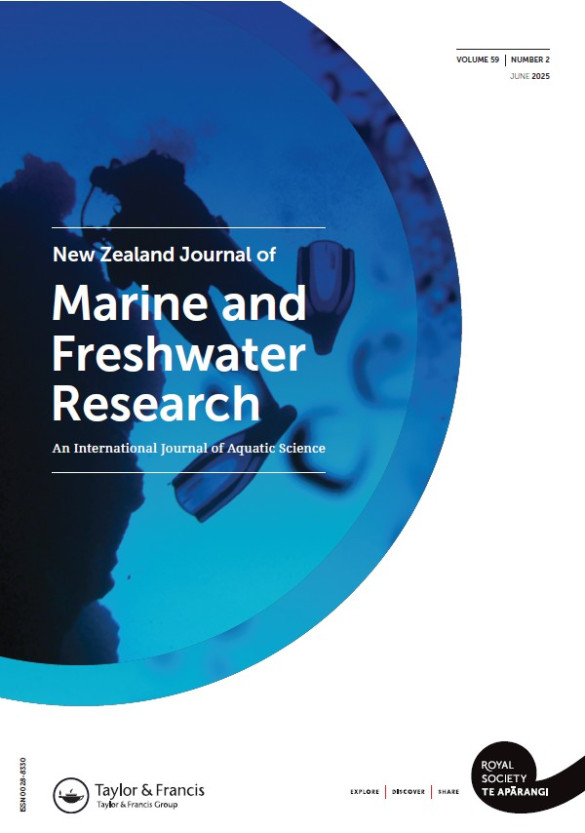News
Published 3 July 2025NZJMFR call for papers Special Issue: Hua te wai ora | Insights from aquatic ecosystem restoration
Ko te wai te ora o ngā mea kātoa | Water is the life giver of all things
Aquatic ecosystems worldwide have undergone profound degradation due to resource extraction, land-use change and the impacts of climate change. These pressures have disrupted ecosystem structure and function, diminishing the ecological health, values, and services these systems provide. As a result, restoration has become a global management priority across rivers, lakes, wetlands, estuaries, and coastal and marine zones. With restoration projects proliferating worldwide, the need to share successes, challenges and lessons learned has never been greater.
To mark the midpoint of the United Nations Decade on Ecosystem Restoration, the New Zealand Journal of Marine and Freshwater Research invites expressions of interest for a Special Issue focused on aquatic restoration in marine and freshwater systems across Aotearoa New Zealand (NZ) and globally. We are especially interested in studies that cross environmental boundaries (e.g., ki uta ki tai / from mountains to sea), integrate diverse knowledge systems (e.g., mātauranga Māori, local ecological knowledge, academic research), embrace holistic perspectives, and bridge disciplines (e.g., physical and biological processes, management strategies, governance, and policy). We will consider all contributions that enhance collective learning, including studies of perceived "failures", which are just as critical as success stories.
We invite submissions on a broad range of topics, including, but not limited to:
- Restoration ecology and theory: Advancing understanding of habitat structure, function, and community dynamics to support aquatic restoration.
- Restoration techniques: Innovations in passive and active restoration methods for aquatic habitats.
- ‘Scaling-up’ projects: Novel approaches and insights for moving from small-scale pilots to restoration at ecologically meaningful scales.
- Monitoring and evaluation: Approaches to monitoring project performance, including ecological and social indicators, and the development of new monitoring tools.
- Knowledge systems in restoration: Successes and reflections on the integration of knowledge systems to strengthen restoration outcomes.
- Governance and policy: Innovative governance models, policy frameworks, and regulatory considerations in aquatic restoration.
- Ecological dynamics and stressors: Understanding how stressor interactions, legacy effects, and cumulative effects influence restoration outcomes.
- Connectivity: Research that progresses knowledge on essential connections between freshwater, coastal, and marine systems with consideration for restoration planning and management.
To capture the rich and diverse knowledge and experiences in this field, we strongly encourage submissions and commentary from multiple perspectives, including researchers, communities, practitioners, planners, policymakers, and resource managers. We seek a mix of research papers, concise thematic and review-style manuscripts (under 5,000 words), and opinion pieces that share valuable experiences in aquatic restoration.
Key words: Ecological restoration, ecological recovery, ecological remediation, species reintroductions, ecosystem recovery, aquatic systems, marine coastal ecosystems, freshwater ecosystems, aquatic conservation, aquatic connectivity.
The guest editorial team is comprised of Jenny Hillman (Auckland), Rebecca Gladstone-Gallagher (Auckland), Helen Warburton (Canterbury), Robin Holmes (Cawthron), and Al Alder (Cawthron).
Submission information
Please send a preliminary title, list of authors and a short descriptive paragraph outlining the scope of your proposed manuscript to the Managing Guest Editor, Al Alder (al.alder@cawthron.org.nz), by 30 September 2025.
The guest editorial team will then decide which manuscripts to invite to the Special Issue, with authors notified of the decision by 31 October 2025. Note that an invitation to submit does not guarantee acceptance for publication; this will depend on the outcome of the normal peer review process and authors meeting critical time schedules. See Author Instructions for the submission of articles to the New Zealand Journal of Marine and Freshwater Research.
The anticipated manuscript submission deadline is 31 March 2026 with the aim of formally publishing the Special Issue in December 2026. Note that papers will be published online immediately once accepted.
Please direct any queries to Al Alder (al.alder@cawthron.org.nz) or the Publishing Team of Royal Society Te Apārangi (publish@royalsociety.org.nz).

